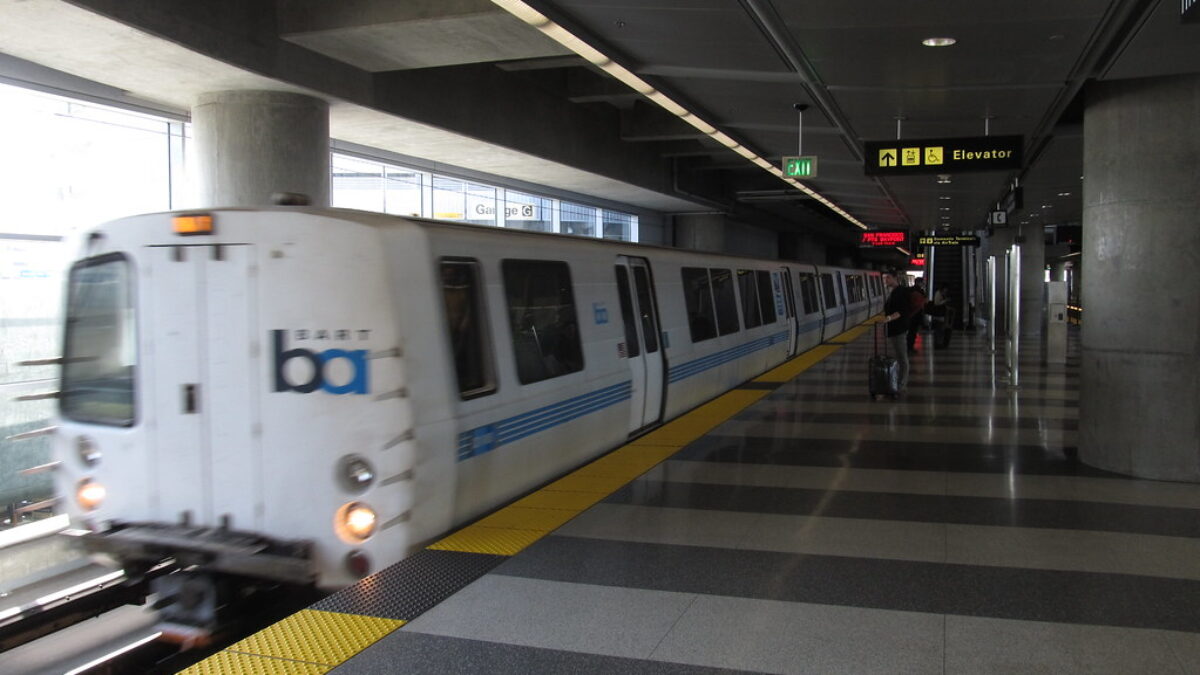When U.S. Sen. Joni Ernst, R-Iowa, slammed then-House Speaker Nancy Pelosi in 2021 for a costly San Francisco-area subway expansion, the California Democrat’s pet rail project was already north of $1 billion above budget.
Incensed, the senator from the nation’s top pork-producing state handed out her monthly “Make ‘em Squeal” award to the U.S. Department of Transportation for “allowing taxpayers to be taken for a ride on this gravy train that is billions over budget,” Fox News reported at the time.
“The tunnel being dug for this subway is literally a bottomless pit for taxpayer money,” Ernst said in a press release. Back then the Bay Area rail project, which originally checked in at an estimated $4.7 billion, had ballooned to $6.9 billion.
That price tag now seems quaint. The cost of Pelosi’s sweetheart deal has soared nearly three-fold.
“I don’t want to ever be sugarcoating things for our” VTA Board of Directors, Tom Maguire, Valley Transportation Authority’s megaproject officer, told the Mercury News. “I think there’s a chance the number is over 12.2 billion dollars, but I don’t know how much higher.”
As Ernst notes, that estimate for the six-mile project now comes to more than $2 billion per mile. Your tax dollars as work.
Such cost surges may be far from over. This boondoggle was supposed to be wrapped up by 2026; now its planners are looking at a completion date of 2037, perhaps at the earliest. So much for “shovel-ready.” All of this despite a federal report estimating that daily ridership in 2040 will be some 20,000 passengers fewer than optimistic estimates by the local transportation authority, according to the San Jose Spotlight.
The Federal Transit Administration — a.k.a. the American taxpayer — is picking up about half the cost of the transportation project.
‘Breach in Transparency’
The massive cost overruns related to Pelosi’s San Francisco treat are just the beginning of some serious accountability problems in government.
A scathing report in January by the Santa Clara Valley Transportation Authority’s auditor general notes that its team has documented what some have characterized as a “breach in transparency.” In some instances, the report notes, communications have been “misleading and/or dismissive of concerns that were related to the project.”
But President Joe Biden and his absentee Transportation Secretary Pete Buttigieg have doubled down on the Bay Area cash suck.
“The FTA has treated this program as one of their top transit projects in the country,” Palo Alto Councilmember Pat Burt, a VTA board member, told the Times-Herald. “They’ve repeatedly found it to be an important and worthwhile investment. And they’re committed to it. However, we still have uncertainties.”
Uncertainties indeed. The bloated subway expansion is but one of myriad examples of transparency-challenged projects funded by the federal government.
It’s all the more worse with the $4.7 trillion in federal funds handed out in response to the Covid scare through the CARES Act, the American Rescue Plan Act, and other legislation. Much of that money has been badly handled and poorly accounted for by the Biden administration.
An audit late last year by the Government Accountability Office identified 49 federal agencies that failed to report data to USAspending.gov, the official website tracking federal spending.
“Although many nonreporting agencies may not be required to report, neither the Department of the Treasury nor the Office of Management and Budget (OMB) have clear responsibility for determining which agencies must report,” the GAO report states. “In addition, among the agencies that did report to USAspending.gov, we found that some reported COVID-19 obligation amounts did not agree with the information in their budget and annual financial reports. “
Ernst authored the provision amending 2006’s Federal Funding Accountability and Transparency Act to ensure that “other transaction agreements” (OTAs) on federally funded projects are reported to USAspending.gov. The Biden administration has clearly failed to follow the law.
The rank offenders include the Pentagon, which can’t seem to pass an audit, and the Small Business Administration. Ernst said the agencies are not complying with two other accountability laws she authored — the COST Act and the Billion Dollar Boondoggle Act, which requires the DOT to “annually disclose all of its taxpayer-funded projects that are $1 billion over budget or five years or more behind schedule.” The Transportation Department is a year-and-a-half behind schedule on releasing the billion-dollar boondoggle list.
As Ernst notes, the transparency act requires all “federal financial assistance and expenditures” be timely posted and available at USAspending.gov. The U.S. Department of Treasury, which operates the searchable public website, insists it need not report “other transaction agreements” (OTAs). That’s not what the law says. The GAO report found more than $40 billion in OTAs were not listed on the site, an amount that is growing “significantly.”
The Iowa senator is awarding her March 2024 Squeal Award to the Treasury Department as she introduces the Stop Secret Spending Act. It would require OTAs to be fully disclosed on the public website and “informs the public of any other secret Washington spending schemes.”
“We all know there is wasteful spending everywhere you look in Washington, but Biden wants to keep you in the dark, because we can’t stop what we can’t see,” Ernst said in a press release. “Thanks to USAspending, for example, I learned EcoHealth—the shady organization that shipped more than one million taxpayer dollars to the Wuhan Institute for dangerous experiments on bat coronaviruses—just received more dollars from the Department of Defense to conduct research on “high-risk pathogens.”
On this Sunshine Week, dedicated to shining a light on the critical need for transparency in government, Pelosi’s pet transportation boondoggle and the other failures by the federal government to account for taxpayer dollars underscore transparency activists’ concerns that the federal government is anything but an open government. Adam Andrzejewski, Founder and CEO of Open the Books, said Ernst’s bill would help give Americans “the full accounting they are owed.”









